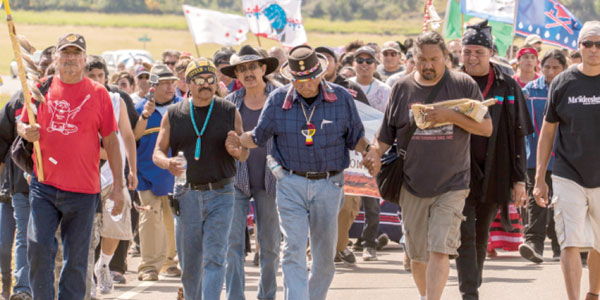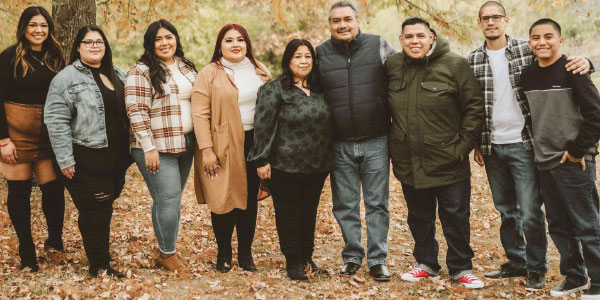
Las tribus nativas americanas y sus seguidores continúan su búsqueda para salvar sus tierras sagradas y los suministros de agua del Dakota Access Pipeline, a pesar de los múltiples contratiempos y la resistencia de las agencias policiales después de meses de protestas pacíficas.
“Muchas de estas personas que están en primera línea, realmente creen en la protección del agua – y están muy dedicadas a eso,” dijo Kelly Daniels, fotógrafa y propietaria de The Kelly Gallery en Overland Park, Kan., y un manifestante del Dakota Access Pipeline. “Pondrán su vida en la línea para hacer una posición para eso.”
Desde que las tribus comenzaron a hacer su posición frente a los desarrolladores de oleoductos en abril, las protestas han atraído la atención nacional e internacional. También han reunido a más de 300 tribus en lo que consideran una lucha por sus derechos ancestrales. Pero Daniels, que ha visitado el sitio dos veces – permaneciendo allí durante una semana a la vez – dijo que las voces de los nativos americanos están siendo desatendidas porque la empresa de gasoductos y otros intereses desean beneficiarse de la construcción del oleoducto.
En la investigación de la cuestión, Daniels ha encontrado que los trabajadores del oleoducto han trabajado recientemente turnos de hasta 69 horas en un intento para terminar el proyecto. El gasoducto de 1,172 millas estaba provisionalmente programado para ser completado en noviembre.
“Están apresurando esto – y sabes que no lo están haciendo bien,” dijo Daniels.
Si el oleoducto se completara, un desastre mayor sería inevitable, según el activista Matthew Rutledge.
“Estoy seguro de que no se terminará. Pero si se terminara, no se trata de si se filtre; Es cuando se filtre,” dijo Rutledge. “Y cuando se suceda, no sólo contaminan el río Missouri y el río Mississippi; también está encima del acuífero más grande de los Estados Unidos, que es el acuífero Ogallala.”
Durante seis años, Rutledge ha viajado a reservas de nativos americanos, visitando principalmente la reserva indígena de Rosebud. Originario de Wichita, Kan., y no afiliado a ninguna tribu, el residente de Kansas City, Mo., ha estado en la reserva de Sioux de Rock Permanente dos veces y siente que la protesta contra el oleoducto es una cuestión urgente.
“Creo que es bueno y esencial para la humanidad que haya personas comprometidas a proteger esta agua, esta tierra y este aire,” el dijo.
Según Rutledge, muchos estadounidenses -incluidos los no-nativos – insisten en que están cansados de cómo el gobierno y los líderes mundiales están destruyendo la tierra, el aire y la agua para obtener ganancias cuando hay varios tipos de energía renovable que se pueden usar.
Rutledge cree que sólo hay una forma de abordar la tensión entre los manifestantes y las fuerzas del orden en el lugar de la protesta: permanecer pacíficos porque una guerra no se puede ganar con el odio.
“La única ecuación para solucionar este problema con la policía es el amor,” dijo Rutledge.
La recomendación de Rutledge es orar – para todos, ya sean oficiales de policía o líderes políticos. Eso es lo que están haciendo los nativos americanos, dijo Rutledge.
_____________________________________________________________________________________________________________
Native Americans continue struggle to save land, water from pipeline
By Katherine Diaz
Native American tribes and their supporters are continuing their quest to save their sacred lands and water supplies from the Dakota Access Pipeline, despite multiple setbacks and resistance from law enforcement agencies following months of peaceful protests.
“A lot of these people that are on the front line, they really believe in protecting the water – and they’re very dedicated to that,” said Kelly Daniels, photographer and owner of The Kelly Gallery in Overland Park, Kan., and a Dakota Access Pipeline protester. “They will put their life on the line in order to make a stand for that.”
Since the tribes began making their stand against the pipeline developers in April, the protests have garnered national and international attention. They’ve also brought more than 300 tribes together in what they consider a struggle for their ancestral rights. But Daniels, who has been to the site twice – staying there for a week at a time – said Native Americans’ voices are being disregarded because the pipeline company and other interests wish to profit from building the pipeline.
In researching the issue, Daniels has found that pipeline workers have recently worked shifts of up to 69 hours in an attempt to finish the project. The 1,172-mile pipeline was tentatively scheduled to be completed by November.
“They are rushing this – and you know they’re not doing it right,” Daniels stated.
If the pipeline were to be completed, a major disaster would be inevitable, according to activist Matthew Rutledge.
“I’m confident that it will not get finished. But if the pipeline got finished, it’s not about if it leaks; it’s when it leaks,” Rutledge said. “And when it leaks, it’s going to not just contaminate the Missouri River and the Mississippi River; it’s also on top of the largest aquifer in the U.S., which is the Ogallala Aquifer.”
For six years, Rutledge has traveled to Native American reservations, mainly visiting the Rosebud Indian Reservation. Originally from Wichita, Kan., and unaffiliated with any tribe, the Kansas City, Mo., resident has been to the Standing Rock Sioux Reservation twice and feels that protesting against the pipeline is an urgent matter.
“I think that it’s good and essential for humanity that there are people making a commitment (to protect) this water, this land and this air,” he said.
According to Rutledge, many Americans – including non-natives – insist they’re tired of how the U.S. government and world leaders are destroying land, air and water for profit when there are various types of renewable energy that can be used.
Rutledge believes there’s only one way to address the tension between the protestors and law enforcement at the protest site: to remain peaceful because a war can’t be won with hate.
“The only equation to fix this problem with the police is love,” Rutledge stated.
Rutledge’s recommendation is to pray – for everyone, whether they’re police officers or political leaders. That’s what Native Americans are doing, he said.










